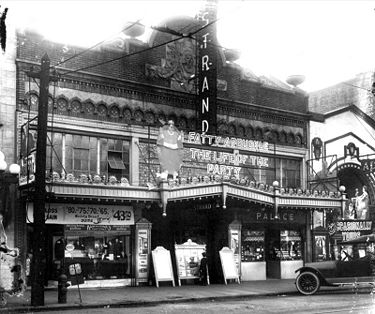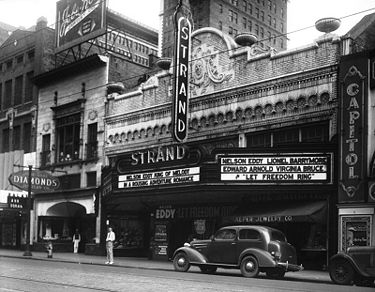Strand Theater: Difference between revisions
(1st pass) |
No edit summary |
||
| Line 1: | Line 1: | ||
The '''Strand Theater''' (briefly called the '''Newmar Theater''') was | [[Image:1920 Strand Theater.jpg|right|thumb|375px|The Strand in 1920. Photo by O. V. Hunt]] | ||
[[Image:1939 Strand Theater.jpg|right|thumb|375px|The Strand in 1939. Photo by W. B. Phillips]] | |||
The '''Strand Theater''' (briefly called the '''Newmar Theater''') was an 800-seat [[List of former cinemas|movie theater]] located at 1913-15 [[2nd Avenue North]]. It was constructed about [[1914]] on the site of the former [[Steele-Smith Dry Goods Company]] store, which was destroyed in a fire. | |||
The theater was operated by S. A. Lynch Enterprises of Asheville, North Carolina, one of the first large theater chains to emerge independent of a particular movie studio. | The theater was operated by S. A. Lynch Enterprises of Asheville, North Carolina, one of the first large theater chains to emerge independent of a particular movie studio. The brick facade featured a central bas-relief and prominent urns on its parapet. Below a frieze of projecting arches was a mosaic tile panel with the name of the theater, flanked by windows. On the ground floor the central recessed entrance had retail tenants to either side. | ||
Equipped with a Pitcher theater organ, the Strand prospered as Birmingham's finest silent movie house. Several silent film stars, including Francis X. Bushman, Douglas McClean and Walter Hiers, made appearances at the theater. A stage was hastily constructed for an in-person appearance by Clara Kimball Young. The [[1926]] feature "[[Men of Steel]]", filmed in [[Ensley]], showed at the Strand following its world premiere at the [[Franklin Theatre]]. The Strand also hosted a revival of D. W. Griffith's "The Birth of a Nation." | |||
[[Richard Kennedy]] became manager in [[1920]] and oversaw the introduction of "talkies". "The Jazz Singer" with Al Jolson ran for 13 weeks at the Strand. | |||
The theater, | In [[1948]] [[Newman Waters]] converted a neighboring theater, the [[Capitol Theater|Capitol]] into a second-run theater call the "Newmar". When it closed a few years later, the Strand took over the name. The Newmar name was removed and the Strand reopened as part of the Acme Theater chain in September [[1959]] with a first-run showing of Walt Disney's "Darby O'Gill and the Little People". | ||
The theater, then managed by [[Henry Hury]], closed on [[November 28]], [[1962]] after a showing of Roger Corman's "Tower of London" starring Vincent Price. The building was purchased by [[Birmingham Trust National Bank]], which demolished it in August [[1963]] to make room for a new parking deck for its [[20th Street North|20th Street]] office. | |||
==References== | |||
* Weaver, Emmett (November 29, 1962) "[http://www.birminghamrewound.com/features/Strand-2%20%2811-62%29.jpg Victim Of Progress— Strand Theater Ends Nearly 50-Year 'Run']" {{BN}} - via [[Birmingham Rewound]] | |||
* "[http://www.birminghamrewound.com/features/bhamtheaters_part3.htm Showplaces of the South, Part 3]" (July 3, 2006) ''Birmingham Rewound'' | |||
[[Category:Former cinemas]] | |||
[[Category:2nd Avenue North]] | |||
[[Category:1914 establishments]] | |||
[[Category:1914 buildings]] | |||
[[Category:1962 disestablishments]] | |||
Revision as of 18:44, 3 November 2012
The Strand Theater (briefly called the Newmar Theater) was an 800-seat movie theater located at 1913-15 2nd Avenue North. It was constructed about 1914 on the site of the former Steele-Smith Dry Goods Company store, which was destroyed in a fire.
The theater was operated by S. A. Lynch Enterprises of Asheville, North Carolina, one of the first large theater chains to emerge independent of a particular movie studio. The brick facade featured a central bas-relief and prominent urns on its parapet. Below a frieze of projecting arches was a mosaic tile panel with the name of the theater, flanked by windows. On the ground floor the central recessed entrance had retail tenants to either side.
Equipped with a Pitcher theater organ, the Strand prospered as Birmingham's finest silent movie house. Several silent film stars, including Francis X. Bushman, Douglas McClean and Walter Hiers, made appearances at the theater. A stage was hastily constructed for an in-person appearance by Clara Kimball Young. The 1926 feature "Men of Steel", filmed in Ensley, showed at the Strand following its world premiere at the Franklin Theatre. The Strand also hosted a revival of D. W. Griffith's "The Birth of a Nation."
Richard Kennedy became manager in 1920 and oversaw the introduction of "talkies". "The Jazz Singer" with Al Jolson ran for 13 weeks at the Strand.
In 1948 Newman Waters converted a neighboring theater, the Capitol into a second-run theater call the "Newmar". When it closed a few years later, the Strand took over the name. The Newmar name was removed and the Strand reopened as part of the Acme Theater chain in September 1959 with a first-run showing of Walt Disney's "Darby O'Gill and the Little People".
The theater, then managed by Henry Hury, closed on November 28, 1962 after a showing of Roger Corman's "Tower of London" starring Vincent Price. The building was purchased by Birmingham Trust National Bank, which demolished it in August 1963 to make room for a new parking deck for its 20th Street office.
References
- Weaver, Emmett (November 29, 1962) "Victim Of Progress— Strand Theater Ends Nearly 50-Year 'Run'" The Birmingham News - via Birmingham Rewound
- "Showplaces of the South, Part 3" (July 3, 2006) Birmingham Rewound

